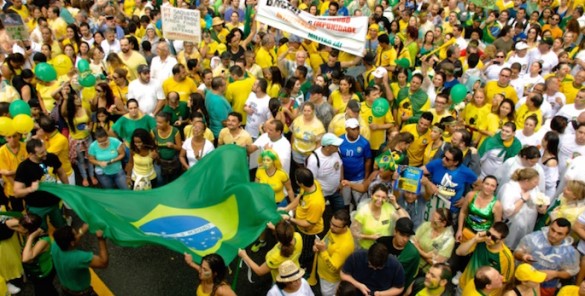
Respect for political institutions in Brazil was low and trending downward even before a 2016 that so far includes a recession, the Zika virus, the collapse of a mining dam and a sweeping political crisis.
“In a recent list disclosed by the Brazilian Supreme Court, 49 top politicians from six different parties have faced scrutiny for involvement in the Petrobras corruption scheme,” said Guilherme Russo, a Ph.D. candidate in political science at Vanderbilt and graduate student affiliate of Vanderbilt’s Latin American Public Opinion Project (LAPOP). Petrobras is a state-controlled oil company in Brazil.
Since the 1970s, LAPOP has gathered public opinion data containing political perspectives from Latin American and Caribbean citizens. In data collected in 2014, citizens of Brazil scored 48.2 degrees on a 100-degree scale in the Respect for Political Institutions category. Only Jamaica scored worse (44.1 degrees).
“[rquote]Respect for political institutions in Brazil had been declining in the years leading up to the current political crisis[/rquote],” Russo said.
In 2010, the respect level was 57.5 degrees. It fell to 53 degrees in 2012 and then 48.2 degrees in 2014.
“Interestingly, the low level of respect for political institutions in Brazil is especially marked among those with more years of formal education,” Russo said. “Those with secondary and post-secondary education have particularly low levels of respect. This difference is statistically significant after controlling for a number of factors including age of the respondent, ethnicity, region of the country, support for democracy and disapproval for President (Dilma) Rousseff.”

Brazilians with no education scored 58.9 degrees in confidence in Brazil political institutions. Those with primary education scored 50.6 degrees, secondary education 46.6 degrees and post-secondary education 45.6 degrees.
“The year ahead promises additional challenges larger than just hosting the Summer Olympics for Brazil,” Russo said. “It would not be surprising if the overall discontent with the political establishment and country’s institutions engenders more public demonstrations against the current government and the political class in general.”
LAPOP develops, implements and analyzes the AmericasBarometer public opinion surveys. LAPOP data and reports are available to interested researchers at the LAPOP website. LAPOP covers 28 nations including all of North, Central and South America as well as a significant number of countries in the Caribbean.